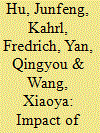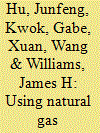|
|
|
Sort Order |
|
|
|
Items / Page
|
|
|
|
|
|
|
| Srl | Item |
| 1 |
ID:
113453


|
|
|
|
|
| Publication |
2012.
|
| Summary/Abstract |
This article investigates the impact of China's differential electricity pricing policy on power sector CO2 emissions using the logarithmic mean divisia index method. The differential pricing policy, intended to reduce energy intensity in manufacturing, is being implemented in eight electricity-intensive industries. The study finds that, during 2004-2009, the policy accounted for a drop of roughly 115 TWh in electricity use, which amounted to a reduction of 82 million tons of CO2 emissions. The policy has been most effective in reducing electricity use in the nonferrous metal smelting and rolling industry, and least effective in the ferrous metal smelting and rolling industry. Because the differential pricing policy has had significantly different effects across industries, improving the policy's design and implementation going forward will require a more detailed understanding and analysis of how it can be better tailored to individual industries.
|
|
|
|
|
|
|
|
|
|
|
|
|
|
|
|
| 2 |
ID:
124169


|
|
|
|
|
| Publication |
2013.
|
| Summary/Abstract |
China's electricity sector faces the challenge of managing cost increases, improving reliability, and reducing its environmental footprint even as operating conditions become more complex due to increasing renewable penetration, growing peak demand, and falling system load factors. Addressing these challenges will require changes in how power generation is planned, priced, and dispatched in China. This is especially true for natural gas generation, which is likely to play an important role in power systems worldwide as a flexible generation resource. Although natural gas is commonly perceived to be economically uncompetitive with coal in China, these perceptions are based on analysis that fails to account for the different roles that natural gas generation plays in power systems-baseload, load following, and peaking generation. Our analysis shows that natural gas generation is already cost-effective for meeting peak demand in China, resulting in improved capacity factors and heat rates for coal-fired generators and lower system costs. We find that the largest barrier to using natural gas for peaking generation in China is generation pricing, which could be addressed through modest reforms to support low capacity factor generation.
|
|
|
|
|
|
|
|
|
|
|
|
|
|
|
|
|
|
|
|
|